#y more. and yeah i prefer a lot more nuance and complexity when crafting+ reading stories
Text
i dont have an actual name for it but depressed college au is probably one of my favorites. i dont really care for the adults in paranatural and thinking about how the activity club/others might grow up and continue their lives is so much more interesting to me
#i started reading this comic when i was 15? i think? and now im recently 23. i cant really say i relate or want to relate to 12 year olds an#y more. and yeah i prefer a lot more nuance and complexity when crafting+ reading stories#but when your protags are 12. well. yeah pass#pnats adults are fine but the kids are the ones i have any actual emotional interest or compulsion towards#so when i write something that might be less 'yippee whimsical wacky adventures' and the options are spender and zarei. again theyre fine bu#t i dont really care enough about spender and zarei#but i still want to write about adults you know. BEING 12 was hard enough you could not PAY me to go back into that headspace#honestly thats actually why most of wizard au takes place in their later school years#like you know those aged up mob psycho 100 aus. where mob is like a fireman and ritsu is an english major and theyre not exactly having epic#adventures anymore but theyre coming into themselves etc. god. thats the stuff 2 me#i used to hate aged up aus as a teenager bc i thought it was the author/artists excuse to put kids in weird situations. and idk considering#it was 2015. yeah fair. but i do think i get it now. teenage years are hard and theres a certain part of that hardness that i love. things#like growing up [from a 17yo perspective] and people you love going to college and trying to find yourself and dealing w friends and fear#for the future. THOSE are the kind of teen stories i like reading about. but when you start getting tired and mellowing out and things that#come with the end of college and grad school and growing up [from a 22yos perspective] is similar. but its more somber. youre older now#when the protagonists become people. thats what i like#wizard au is fun as a huge intense magical adventure project but depressed college au is just like. where i can project.#drinking an entire pack of mikes hard lemonade by myself and lying on the floor talking to friends about how im scared and pushing myself#towards a career that i love but dont know i can achieve. friends leaving. getting an apartment for the first time. and the second and#the third. that feels better when i can sit down and go 'okay. someday isabel will do this too. i might not understand. my friends might not#understand. nobody could understand and i could be alone. but max woke up with a hangover today and i know what that feels like' etc#idk just feels better. taking your favorite characters with you while you go through things. by which i mean#'taking my favorite characters and making them go through things'#you want them to be safe and happy and having fun. i want them to feel fear. we both know what we want from fiction and treasure each#depressed college au
4 notes
·
View notes
Text
Scary Mask
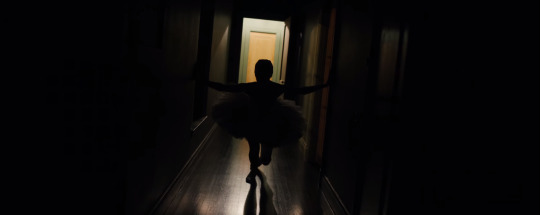
I.
I don’t know what to say when people come apart
The road is long, the road is dark
And these are just the words to somebody else’s song
Before I get into it, I’d like to quickly note that this is not best post to start with. Same goes for the one on “Me Laughing.” My older posts are much friendlier reads and not nearly as dense.
Okay, let’s go.
At first I thought “Scary Mask” was straightforward, i.e. Poppy uses her persona (“I wear my scary mask”) as a defense when she finds herself in uncomfortable situations (“when I’m afraid I don’t belong”). “Well that was anticlimactic.” Indeed. But, of course, this is Poppy we are talking about, and nothing with Poppy is quite so simple.
The problem with basic interpretations that sum up a song with single sentence is that such readings miss all the nuances of the work, i.e., they leave out all the fun little twists in the lyrics, the double-meanings in the lines, etc. Basically, simplistic interpretations of lyrics ignore all the poetry, which is part of what allows music to transcend language. Poetic lyrics also provide us with new pieces of language so that we can better understand the increasingly complex world around us. Nestled in the gaps between our definitions lies the inexpressible that only poetry can render sensible.
Well-written (read: poetic) lyrics are part of what allows songs to completely baffle us; they allow songs to elude simple characterization and slip the shackles of obsessive categorization (e.g., genre). A truly great piece of music leaves us speechless; we cannot simply explain it to someone. Instead, the best we can do is say, “you know what? Just listen to this,” to which they are only able to reply, “wow… you’re right.”
This is why I love metaphors and dualities. Yes, I realize the previous sentence just caused every person who hated English in school to audibly cringe. Look, I’ve been there, I get it. I used to think English was a cruel joke played at everyone’s expense and that it was stupid because ‘there is no right answer.’ Then one day, all of that changed. Almost as though a switch was suddenly flicked ‘on’ in my brain. It wasn’t until I understood English that I finally appreciated it. I’ve never wanted to go back, so hear me out.
Metaphors are essentially a way of controlling the associations formed by your brain when you read or hear a word. They can make you associate simple pieces of language with something extraordinary, and make you see things in a way you would never have previously considered.
If you’d like to get fancy, you can start introducing dualities; that is, setting two concepts on opposing ends of a spectrum. When you do so, you allow the reader to consider new and (seemingly) impossible gradations, all born from the struggle between two relatively ordinary ideas.
Take, for example, Poppy’s ‘poetry-ecstasy’ duality that she introduced in “X.” This was the first thing that made me take a more serious look at her work, i.e., “I think something else is going on here…” We know poetry and ecstasy are meant to be diametrically opposed in “X” because the colors in the music video change in sync with Poppy’s delivery.

If YouTube subtitles weren’t broken, they would read: “poetry, poetry, poetry”

Likewise: “ecstasy, ecstasy, ecstasy”
It’s not obvious that poetry is the opposite of ecstasy unless you’re in Wonderland in which case, you messed up somewhere. Moving on, when you set two concepts against each other like that, you introduce a new interplay between the two ideas. Now the audience is forced to see things from a new perspective, one they would not have otherwise considered. Or, they just ignore it, as is usually the case, but I digress.
With all this in mind, further study into “Scary Mask” reveals that some parts of the more basic reading don’t quite add up. Take, for example, lines like, “M-A-S-K, am I okay?” or “You ain’t gonna see me tonight”; these lines refuse to fit neatly into the obvious interpretation e.g., why spell out ‘mask’? Why are [they] not going to see “you” “tonight?” Most people would choose to ignore these outliers or simply shrug and go about their day. If this post’s existence didn’t clue you in, we won’t be doing much ‘shrugging’ or ‘ignoring.’
You’ve probably noticed this already, but I try to forge readings of Poppy’s work that fit as many different pieces as possible into them. To craft interpretations that capture the interplay between all the elements in a song. Often, this requires approaching the song from multiple angles, some even being right. If this post is good, each interpretation should form its own colored shard of glass, leaving the reader with a beautiful explanative mosaic. If this post is bad, grab a broom and wear shoes for a week.
Hilariously, doing justice to the more abstract bits of art usually means I have to use figurative language to explain other figurative language. “Sounds meta.” Indeed. Some puzzles can only be done justice with other puzzles, which is also why my writing frequently dips into obscurity. Close reading yields wonders, but means interpreting ‘carefully’ and ‘openly.’ “Sounds like a lot of work.” It is, but anybody can come up with a vague idea of what a song is ‘about,’ e.g., “this one’s about love!” How insightful, you should post that on Genius, that’s just what they’re looking for. I mean, really, at that point what are you even getting out of the song? A few minutes of pleasure before you move onto the next one? Is that it? Are you going to just spend your entire life constantly devouring one helping after another, waiting hungrily for your favorite artists to dish up your next meal?
I may be going to hell, but at least I won’t be stuck doing that.
II.
Rise and shine—
get out of bed!
Take my hand,
there’s darkness ahead.
“Scary Mask” is one of Poppy’s best songs. No, I’m not interested in arguing about this. It is also one of Poppy’s most important songs. This, however, I am interested in arguing about.
For the sake of the following discussion, I will be ignoring most of Poppy’s singles. “Metal” and “Immature Couture” and [other singles] are good but they complicate things and I don’t have time to deal with them, despite having the time to tell you how little time I have. Fancy people would probably call such exclusions “exceptionally non-rigorous,” but I’m over it.
I tried to make this section not-boring, dunno if I was successful; my writing takes on the flavor of whoever I read last, hence why the “Me Laughing” post reads like schizophrenia. Lately, I’ve been feeling especially masochistic, so I’ve been reading [redacted]. Expect that to shine through.
Let’s zoom out for a bit: “Scary Mask” is the flagship song of Poppy’s Choke EP, though I am sympathetic to arguments for “Meat.” “Scary Mask” ties the whole EP together and makes it possible. It’s critical to Choke’s ‘flow.’ This isn’t a given, I’ll explain/pretend to explain.
The structure of Choke almost perfectly mimics that of a five-act play. Yeah, like that Shakespeare guy. The EP contains exposition, rising action, a climax, falling action, and a conclusion. The methodically squeezing “Choke” sets the mood and introduces a problem statement to color the rest of the EP. With its pendulum-like bassline and hypnotizing array of voices, “Voicemail” depicts a forsaken mind becoming further and further dissociated from reality. A complete breakdown occurs in “Scary Mask,” the explosive climax of the EP and, at least so far, Poppy's work. Following “Scary Mask” comes the bleak and gruesome “Meat,” which is clearly akin to the falling action. And finally, we are given “The Holy Mountain,” the EP’s pessimistic and wistful send-off.
As for the context in which “Scary Mask” was created, Choke comes after two pop-y records, Bubblebath and poppy.computer, and a half-pop, half-??? disc, Am I A Girl. After AIAG, Poppy had a choice: back off and return to pop or double-down and bring on the metal. Thankfully, she chose the latter and made Choke. Let’s all take a minute to praise AIAG for even allowing Poppy such options, for flowing together so smoothly, etc. Okay, séance over, let’s return: “Scary Mask” carried Choke, without it, the EP would’ve been severely lacking a massive, stand-out song to serve as the EP’s creative apex.
“Scary Mask” is, in a sense, the ‘no turning back’ point for Poppy. Producing “Scary Mask” was like Poppy locking her old style away and throwing out the key; “X” and “Play Destroy” were #wild, but “Scary Mask” was the third strike. Put confusingly, “Scary Mask” was Poppy’s ‘home run’ while also being the ‘final nail in the coffin’ and other idioms. The track is so far removed from the days of Bubblebath and P.C that it actually created a distance, a gap, between nu-Poppy and Pop-y. “X” has pop elements and Poppy cutely ‘ooo-ing’; it was walk back-able. “Scary Mask” has Jason Butler demonically screaming and saying the ‘fuck’ word; fine print says “no refunds.” Or, if you’d prefer analogies that are unlikely to age well: think of a giant iceberg breaking off from the main Arctic glacier and slipping into the cold, dark sea. Once it’s off, it’s not freezing back on. In other words, once Poppy dropped “Scary Mask,” ‘princess with a pistol’ became ‘demonic metal queen.’
I’ll also argue that “Scary Mask” is the least compromising song in Poppy’s current discography. It’s her truest expression of self pre-I Disagree. All artists have to make their music listenable-enough to get bread, just like I need to make my writing readable-enough to get read. Unfortunately, compromise is inevitable, but artists can still create good music. It’s just hard and getting harder. Plus, nobody agrees what ‘good music’ even means because we have no rigorous definition for art so—
When an artist decides to really ‘go for it,’ to make no compromises, and does it well, a beautiful thing happens. That’s what “Scary Mask” is for Poppy; she decided to pull no punches, and the result was, well, “Scary Mask.”
“X” and “Play Destroy” were both successful, but they didn’t guarantee Poppy’s nu-success. “Play Destroy” had Grimes, and “X” could have been an anomaly. If Poppy went back to pop, fans could have passed off her dip into metal as ‘weird’ but ‘kinda cool’ and that would be that. However, Poppy didn’t let up—“Scary Mask” proved she could consistently make quality metal tracks, and now we’re here and Poppy is about to destroy the world or something. Nice.
In summary: “Scary Mask” functions to transition Poppy’s sound, it does a damn good job of it, and I’m definitely looking forward to her new album.
III.
You try to take the best of me
Go away
You try to take the best of me
Go away
Alright, zoom back in. Yes, “Scary Mask” made it possible for Poppy to throw in crazy distorted guitars and for everyone to love it, but it does more than that. “Scary Mask” also transitions Poppy her(?)self, which sounds strange but it will make sense later, probably.
Now time for the fun part.
Sometimes I like to begin my analysis with a song's verses before circling back to the chorus, as was the case with "The Holy Mountain," however, "Scary Mask" is so crazy that it doesn't even matter where I start. It's what I lovingly refer to as “straight-up bonkers,” like some twisted monstrosity tearing its face off as it stumbles around in the dark. Reminds me of the psychos from Borderlands, an analogy that already has not aged well. Basically, “Scary Mask” is all over the place, so I might as well start from the ‘beginning.’ I'm going to have to pick up the pieces and stitch them into some monster that would do Mary Shelley proud anyway.
Let's dive in.
Poppy opens the song with: “I wear my scary mask when I'm afraid I don't belong.” Okay, seems pretty straightforward so far. There isn’t much to work with here, but maybe we can add some color to this line. BUILD series conducted a relatively listenable interview with Poppy earlier this year. One excerpt to note:
Interview: “Well, why wear a mask?”
Poppy: “Sometimes you just have two faces.”
Interview: “And that’s okay?”
Poppy: “Only sometimes.”
This is why I was debating just skipping “Scary Mask”—the opening line was a little cliché, and it seemed like Poppy had taken Batman Forever literally, neither of which are particularly good signs. However, I want to stress that lacking an interesting message wouldn’t necessarily make “Scary Mask” a ‘bad’ song. This idea may seem very strange, especially in modern society where it appears everyone agrees that deep themes=good art. We’ve been raised with the notion that the best art is art that tells a message, and it’s difficult for us to consider otherwise. However, not only does the conception of ‘depth’ quickly fall apart (as I noted in the “Me Laughing” post), but it’s entirely possible that thematic elements have absolutely zero bearing on the aesthetic quality of a work. In other words, ‘themes’ may not be what make art ‘good.’
Yeah, take a minute and think about that.
Anywho, after deciding I could afford to pay attention, I found many interesting things. Note Poppy’s word-choice. She uses the word “scary,” an almost child-like characterization of something fearful. Indeed, in the music video, Poppy’s hair is hidden or pulled back, giving her a youthful appearance. Look, pictures:


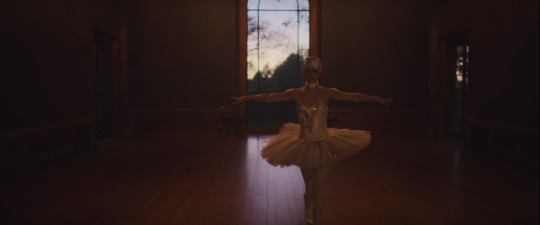
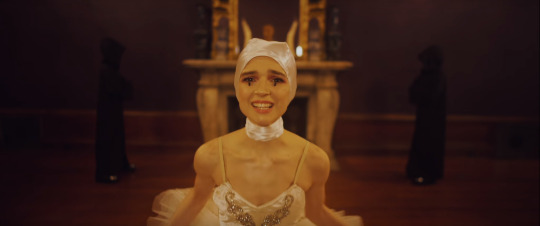
Moreover, peppered throughout the song are Poppy’s pouty squeals and she sings with call an almost ‘whimper-y’ tone, the end of her words marked by a spike in pitch. Obviously, we’d like to ask: why is she presenting herself to us this way?
We find answers in the second half of the line: “when I’m afraid I don’t belong.” Okay, so when she finds herself in situations where she is uncomfortable, where she is struck by the feeling of being small, almost child-like, she resorts to the mask as a defense mechanism. Now we’re getting somewhere, though I would like to ask: why is the mask “scary”?
Being two-faced does not necessarily mean the one face has to resemble Harvey Dent post-toasting, it could simply be a different side of your personality. Perhaps the next line will help:
You can’t read my brain until it’s off
Note Poppy says “brain” instead of any other word such as ‘mind’ or ‘thoughts.’ Using the word ‘brain’ signals a sense of invasiveness. Think: Sylar from Heroes cutting open peoples’ skulls and studying their brains for secrets. I’m sure many obsessive fans have tried digging up details on Poppy’s personal life and many interviewers have tried asking her inappropriate questions. It appears that Poppy wears a “scary mask” as a counter to such intrusions, as if she decided that the only appropriate response to these inappropriate behaviors was a face-to-face with the scary mask.
Holy shit, was this entire song written as a response to the AMP Radio interview? That would be hilarious.
Poppy then repeats that the mask is “not coming off.” Hey, wait a minute…
Okay, so after a fairly badass guitar interlude, Poppy begins feverishly chanting the lines: “I'm never gonna take it off, so don't touch me / Never gonna take it off, stop looking at me.” I’m sure some fans hate me because I’m always banging the drum that Poppy’s work is about obsession, and thus, appear to be attacking them, but come on, how clear would you like the message to be? Go watch “Repeat After Me” if you’re not convinced.
Anyway, in a sense, Poppy’s scary mask (read: freaky persona) operates as a shield from foreign bodies who seek to violate her personal space.
I’m going to leave Jason Butler’s lines for the end because, well, you’ll see.
IV.

In the music video for “Scary Mask,” after Poppy first puts the mask on and has a little breakdown, there are many instances where she is no longer wearing the mask, but is still acting like a possessed teen in desperate need of exorcizing. This is weird, here are some possibilities:
1) Poppy takes the mask off in the music video because she’s pretty and people want to see her lip-syncing.
2) The mask was always on.
We’re going with door #2.
Let’s look at some of the weirder lines, like Poppy chanting the incantation: “M-A-S-K, am I okay?” By spelling out ‘mask,’ Poppy signifies that the “am I okay?” question is directly referencing the mask she wears. In other words: is it okay for Poppy to wear a mask?
We already know Poppy came down pretty hard on one side of the fence when she answered “sometimes” in the BUILD series interview. My equally unambiguous answer is: “it depends.” There are many reasons why wearing a ‘mask’ is a terrible thing that slowly renders you psychologically ‘fucked,’ go read TLP or Lasch if you want more info on that (actually, you should just read them anyway). However, we’ve already established “Scary Mask” was an empowering song for Poppy because it served as a truer artistic outlet for her, so any masquerading should be approached with this in mind.
Alright, so when is it a good thing to wear a mask? How can it be a good thing to pretend to be someone you’re not?
Well, when you’re an artist, you typically create art to express something. Often, this ‘something’ is deeply personal to yourself. You put a lot of yourself into your work. This means criticism of your work can really hurt. After all, if someone calls your [song/painting/writing] ‘trash,’ it’s like calling you ‘trash.’ It feels like that criticism is aimed directly at that piece of yourself you put into your work. Yeah, that sucks. Sometimes it’s so difficult to bear that you avoid creating anything so you don’t have to be faced with such attacks. You forgo creating art because the injurious potential of criticism is too daunting. Without a creative outlet, your feelings remain bottled inside, slowly eating away at you from within. It’s a lose-lose game and everyone’s the player.
So, you ask: “what do I do?”
Well, that’s where the mask comes in.
The artist can use a persona to get around these problems. In other words, putting on a mask can actually allow you to finally be yourself, which seems paradoxical, but I’ll explain.
Take, for example, me. After reading enough of the silly words I write, you may start to form a picture of me in your head. To speculate and fantasize about what I actually look like or how I actually act. Without even knowing your thoughts, I can assure you that any such conceptions are completely inaccurate. I know that I’m not actually as [adjective] as you imagine me to be because I work with a protective persona. The persona allows me to write without worrying too much harsh criticism. Hence, with a persona, I can safely express myself through my work.
The same is true for Poppy. As I’ve noted in previous posts, Poppy has a lot to say about the world. She would like to express these messages artistically, but it’s not always easy to face criticism of her work (and Poppy gets a lot of hate). By adopting the ‘Poppy’ persona, Poppy is able to safely express herself. To finally say what she wants to say. To be who she really wants to be. And when she is faced with scathing criticism, she is able to continue her work undeterred because it feels like the criticism is directed toward Poppy (persona) instead of Poppy (person).
An alternate (and hilarious) reading of the lines “M-A-S-K, am I okay?” and “I’m alright, I’m alright, I’m alright” would be to imagine them as part of a demented question-and-answer period with Poppy. Many of her fans have expressed concerns over the effects of living your life pretending to be a [robot/alien/demonic angel], not to mention the section of Poppy’s fan-base who seem to constantly worry about Poppy being Titanic’s so-called ‘puppet’ and that he is abusive towards her. You can interpret Jason Butler screaming “I’m alright, I’m alright, I’m alright” as Poppy’s response to such concerns. Seems like an appropriate answer to me.
V.
You try to take the best of me
GO AWAY
YOU TRY TO TAKE THE BEST OF ME
GO AWAY
YOU TRY TO TAKE THE BEST OF ME
GO AWAY
There are some remarkably odd lines in “Scary Mask” that need some serious groundwork to render sensible, so let’s switch gears for a second and complain about pop music. Yes, I know. It’s not exactly brave (let alone novel) to decry pop music as a vapid and soulless caricature of art, but I find it therapeutic. Plus, I’m clearly writing a narrative here. If these words make you indignant, first ask yourself ‘why?’ and then relax. I listen to pop music too, most of which is terrible. Also, I’m talking about the correlation, not the rule. If you fight me with exceptions, I’ll hit you back with trends.
Pop is the most apologetic music genre out there (though mumble rap and country are giving it a run for its money, literally); pop music’s main purpose is stated by its terminology: it exists to be popular. To be as widely palatable as possible so as to garner as many listeners as possible. The implications associated with a genre revolving entirely around popularity for the sake of commercial success are pretty disgusting. I’d even go so far as to say the existence of ‘pop’ as a musical genre is a strong indicator that culture is no longer treated as an essential component to human society, but is instead only another industry, and has been for a while. People love celebrating the façade or appearance of culture (partially so they can consider themselves ‘cultured’), but the truth is that culture now exists mainly as a commodity to be endlessly repackaged and sold back to people under the guise of ‘art.’ “I blame capitalism!” Sure, and you may not even be wrong, but that’s a discussion for another time. The point here is that to successfully create music with value, music that isn’t just a meaningless product, one needs to escape such a hyper-commoditized regime i.e., the corporatized pop-music industry.
Business-wise, Poppy did this by ditching Mad Decent and signing with Sumerian Records, an independent label which will hopefully make her very happy. Music-wise, she also had to transition. Recall: putting on the mask (read: persona) allowed Poppy to be herself and make the music she wanted to. So, to evolve her music, she had to also evolve the mask. After releasing two and a half pop records, people will generally expect, well, more pop. People don’t like when their favorite artists abruptly change, probably because they don’t wish to face the idea that said artists were never making music for them in the first place. Either way, for Poppy to tell tales of an impending apocalypse or drop an insane metal album like I Disagree, she had to ease fans into it. Musically, this is the second half of AIAG and the entirety of Choke, but it’s also a perfect encapsulation of “Scary Mask.” It’s possible that the bipolar nature of songs like “X,” “Concrete,” and “Scary Mask” is only due to Poppy trying to transition her sound without upsetting too many fans. Hence why these songs incorporate lighter sections to balance out the darkness. Perhaps “I Disagree” is as dark as Poppy’s going to get, but given recent news of her hanging out with Nadya Tolokno from Pussy Riot, I doubt it (“don’t know how long until they see the rest of me”).
This is also where Poppy’s YouTube videos come in. While producing new music, she can quickly put out a few videos and slowly ramp up the darkness, facilitating a comfortable change in artistic tone for the fans. Something, something, frogs and hot water.
Considering all of the above, I agree with something @thatpoppyuk said a while back in regards to people saying “Moriah is coming out!” when Poppy dyed her bangs:

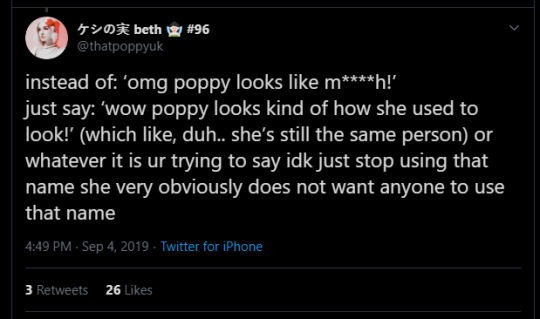
Not only is it potentially insensitive to call Poppy ‘Moriah,’ it’s simply inaccurate. For better or worse, people don’t regress, they progress. Poppy is not doing something so #basic as ‘returning to her roots,’ she is becoming who she’s always wanted to be.
VI.
Now that we have completed the necessary groundwork, we are able finish off the rest of the song. Lyrically, “Scary Mask” is rather focused; we’ve actually covered all of Poppy’s lines, so I’d like to examine the role Jason Butler from Fever 333 plays in the song.
I’ve actually refrained from gushing about how good “Scary Mask” is until now, but I don’t think I can contain myself any longer. Fever 333 was an excellent feature that perfectly meshes with Poppy’s harmonics and the chomping guitar riffs. Not only that, but lyrically, Jason Butler brings an insane performance. He brings scary mask to life.
Fever 333’s role in the song is complicated and will take multiple approaches to flesh out. First, consider the scary mask (Jason Butler’s lines) as an entity speaking for Poppy, as though it were some demonic hype-man:
This would then explain the line, “well you heard the woman, so fucking look away.” It appears that Poppy needs someone telling others to “fucking look away,” betraying a sense of dependency. After all, if Poppy could handle such onlookers on her own, she wouldn’t need someone else telling them to ‘beat it.’ We may interpret this as a sign that Poppy has come to rely on the shielding-nature of the mask. She relies on her persona for protection, but reliance gives way to over-reliance. Naturally, substitution and dependency follow.
However, this isn’t wholly satisfying, nor is it very charitable. Let’s consider another, more empowering, approach, this time as Poppy speaking through the mask. In this case, a synthesis is underway between Poppy and her new persona (read: scary mask). During the violent transformation, she screams and struggles as the darkness of the mask washes through her, until the process is complete and both are one. Or, rather, Poppy is transcending her persona through her persona, a process of metamorphic self-realization.
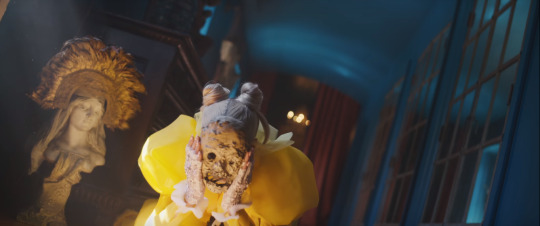
Approaching the relationship between Poppy and the mask as a symbiotic one will perhaps explain one of the most bizarre lines in all of Poppy’s discography (minus every line in “Voicemail,” of course): “You ain’t gonna see me tonight!” I mean, what the hell. It’s difficult to explain how much this line confuses me, words simply elude me. This is one of those lines that normal people would shrug and come up with a half-hearted explanation such as: “well, Poppy is wearing a mask, and because she is wearing a mask, you aren’t going to see her. You know, because she’s wearing a mask.” Poorly-conceived explanations such as these negate the whole point of studying art. You can’t just jerk responsibility when ‘the going gets tough.’ The reward isn’t merely the end result, and people who believe this are the exact same people who Genius exploits. It is the work, the method, the climb, the struggle that is important because it is while grappling with the piece that one learns the most about oneself. With that being said, this line has haunted me for three weeks now, but I think I can do it some justice.
First, we examine the context in which the line appears in the song. The line first appears near the beginning of the song, wedged between a crushing guitar interlude and the Poppy’s staccato-ed “M-A-S-K, am I okay?” build-up. Then the line comes again at the end of Jason Butler’s insane post-chorus breakdown which is interlaced with Poppy’s disembodied screams. This second appearance follows a punchy chorus from Poppy and directly precedes a charged guitar solo and Poppy’s explosive final meltdown. From all this, we notice that “You ain’t gonna see me tonight!” is always delivered amidst a great deal of turmoil, always sprinkled into the middle of a violent episode.
Next, we look at the line itself. “Ain’t” and “gonna” are very colloquial, like the speaker hasn’t been taught to speak ‘properly’ or has lapsed into a state where they are unable to or simply do not care. I’m also picking up a touch of mentally-disturbed giddiness, as if some deranged killer is frothily barking this at you outside your window while his head jerks around. “Well, I’m definitely glad not to live on the ground-floor.” Likewise.
I must comment, however, that “Tonight” is an odd word choice. “Well, maybe they just needed a word that rhymed with ‘alright’?” Remember what I said about giving up when things get difficult? No, “tonight” relates a sense of shadowy immediacy, like a doom drawing near. Perhaps Poppy is about to descend upon the world, shrouding it in darkness with her black angel wings.
Hence, “You ain’t gonna see me tonight” relates the sense of foreboding violence that comes with Poppy’s new persona. This makes a lot of sense in the context of Poppy’s work because I Disagree is likely going to be her most aggressive album yet. See, for instance, “I Disagree.”
Basically: full dark, no stars; Poppy’s out for blood, time to take cover.
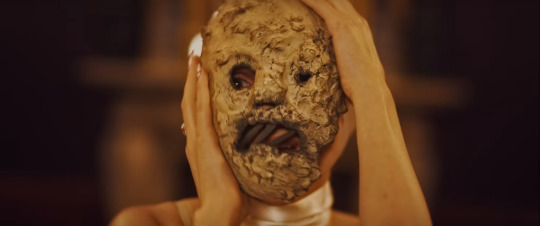
VII.
In summary: the ‘scary mask’ is a protective garment for Poppy as well as an empowering one. The adoption of an artistic persona allows her to cope with criticisms and continue her work. Recently, she has adjusted her work, and thus, her persona, to something truer to herself, and “Scary Mask” was an integral part of her transition.
Well, wasn’t that fun? I know I enjoyed myself.
Wait, what? You have a question? Ah, wait—I know what you’re thinking:
“If Poppy only wears her ‘scary mask’ when she’s ‘afraid she won’t belong,’ then why is she ‘never going to take it off’?”
Well, maybe she feels like she will never belong.
5 notes
·
View notes